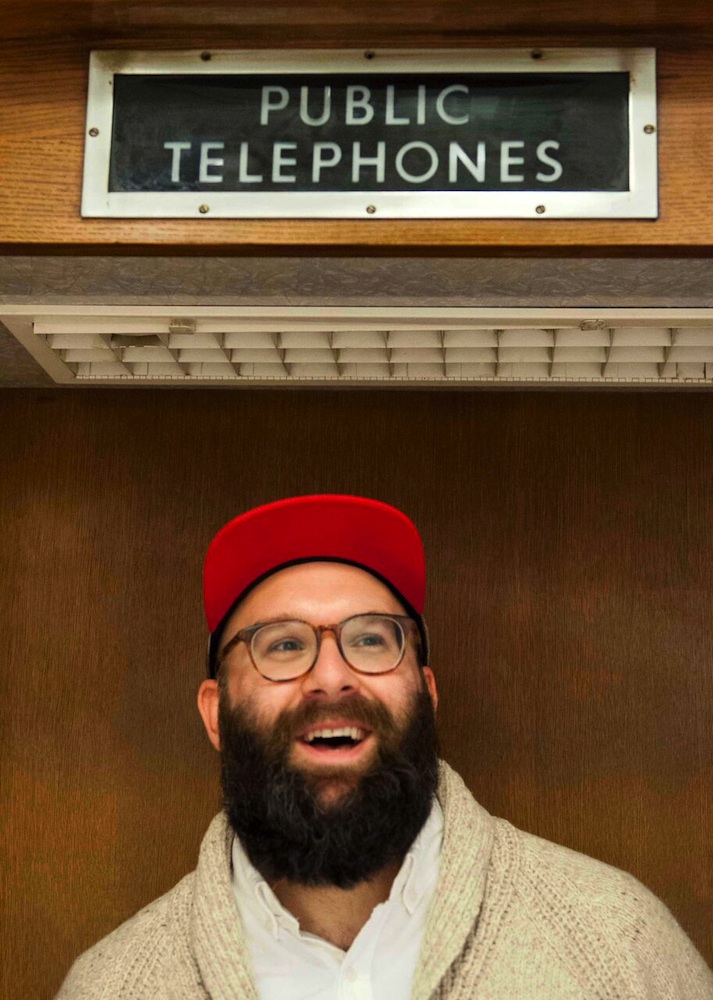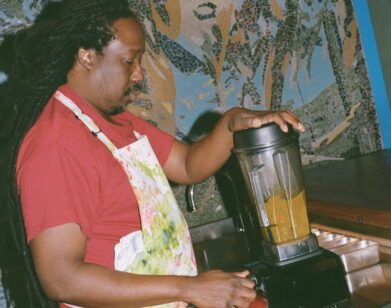Jason Diamond and the Myth of John Hughes

Jason Diamond’s debut memoir Searching for John Hughes (William Morrow) is a funny, quirky, aching coming of age tale. Growing up in the suburbs of Chicago in a dysfunctional home, Diamond always felt like a misfit. He was drawn to fictional worlds, especially novels and the films of John Hughes, which were shot literally “in his backyard” and depicted an existence he glorified. Moving to New York with big dreams of becoming a writer, Diamond ended up slinging cupcakes at Magnolia Bakery, wondering what happened to his aspirations.
Through sharing his trials and errors—being broke, working on a John Hughes biography he never finishes, loneliness—Diamond’s tone is not self-pitying but rather lyrical and hilarious. He laughs at his missteps and by doing so eventually overcomes them. Diamond reminds readers that anyone who has ever felt like an outcast—more Cam, the sad eyed best friend sidekick than Ferris Bueller, or the sulky band of weirdos from The Breakfast Club—perhaps in the end has a more interesting story to tell.
We spoke with Diamond about escaping your past, bravery, not quitting, Nazis, how movies shaped him, and what it means to become your best self.
ROYAL YOUNG: What’s it like escaping your past and shaping a new identity?
JASON DIAMOND: For me, even though I grew up right near Chicago, which is a great big city, I think I always knew I needed to go somewhere different. I think a lot of people feel that way. The minute I realized it was time to do that was when I told myself I needed to be in charge of my life and get my shit together. I didn’t know how I was going to do that.
YOUNG: Where do you think that boldness comes from? It takes a lot of bravery to decide to change your life.
DIAMOND: I moved around a lot as a kid, so moving to a new city—whether it was the suburb next door—it was never easy, but I got used to that vagabond existence. Through high school, it was a survival thing; I was always sleeping in different places so that wasn’t hard. Boldness came from curiosity. I had 500 dollars in my bank account; I could spend 100 dollars on a Greyhound ticket just to see what happens. Midway through the worst bus ride, I realized there was nothing to go back to and I had to make it work. I don’t know if that’s boldness as much as sink or swim.
YOUNG: Your early experience of instability, which could be perceived as negative, ended up serving you really well.
DIAMOND: Yeah, it definitely did. When people say it’s sad, yeah, I was really sad a lot and crap happened, but I’m not like Rocky Balboa, I’m just not really good at quitting. I had all these ghosts in my head yelling me that I suck, but you have to hold on to those things—that hatred and fear—and use them to keep going.
YOUNG: You describe in the book inner hatred, but also outward hatred, like witnessing Nazis. Growing up an outsider.
DIAMOND: My grandparents on my dad’s side lived through the Holocaust. I was born in this town that I think at the time had one of the largest populations of holocaust survivors outside of Israel and New York. One of my early memories that stuck with me my entire life [was that] they built a monument of a mother holding a baby, this really sad statue, and people carved swastikas into it. My mom said, “I need to show you this, because this is your background.” She explained the Holocaust and what my family went through, and at that moment, I was four or five, I realized there are people that will try to hurt you and hold you down. Obviously Nazis and fascists are different from assholes in high school, but it alerted me to this sad narrative of humanity that there are people who want to live and then the people who want to hold them down. I’ve tried to not be one of the latter my entire life.
YOUNG: You have a line that you viewed “movies as blueprints for what you wanted life to be.”
DIAMOND: Movies and novels, the two things that informed and taught me the most, are forms of escapism. I thought that was how life could look if you wanted it to. John Hughes’s movies served as a perfect example. I saw nice homes with nice lawns and good-looking high schoolers whose biggest problems were some girl or boy didn’t like them. I thought that was incredible. My parents separated when I was three, so that dream was shot, but I still had dreams of a perfect life. There’s no such thing as a perfect life, but if you hold on to that long enough and watch it get chipped away, that’s really hard to deal with. I had no one telling me otherwise.
YOUNG: There’s a duality here. Yes, you moved around a lot and it was unstable, but that enabled you to move to New York. Yes, your idea of life through movies and novels was unrealistic, but it enabled you to eventually find love and write a book. The things that could have held you back ended up pushing you forward.
DIAMOND: Yeah, it’s a funny thing. You’ve written a memoir, so you know how it is. You get to reflect and it’s this amazing thing where you can’t believe that all this stuff amounted to something, and therefore you amounted to something. To me, that’s beautiful. This is kind of what I thought I wanted. You work for it, but it still happens.
YOUNG: What do you think becoming means?
DIAMOND: There are different ways of looking at it. Becoming a writer, which is a theme in the book, you can always be writer. It’s not so much a metamorphosis as it is finding what you want. You can also become something you don’t want to become, but it’s a change, a new phase. Hopefully one you want.
YOUNG: There’s this struggle throughout the book of feeling weird, abnormal, and creative, but wanting to be normal. Maybe becoming is about becoming your truer self.
DIAMOND: Yeah, I was really conscious of that and the process of writing the book helped me hash that out. I always felt like a weird outsider and I did at some point in my life start to embrace that. I’m happy I do, but I think you’re conditioned, especially in America, that there is this line you have to walk down. Anybody who wants to move off that path at any point in their life is my hero. Anybody who goes off that path has to wrestle with that. There is no normal life; it’s just an idea we’ve been fed. People who realize that tend to be the happiest.
SEARCHING FOR JOHN HUGHES IS OUT NOW.






